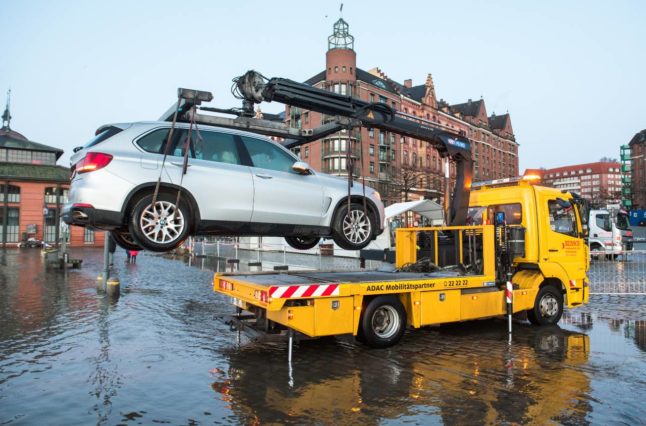Five well-paid jobs in Germany that nobody wants to do
Life in Germany is getting more expensive by the day. From high heating costs and rents to hiked-up prices in the supermarket, it seems everybody is having to dig a little deeper in their pockets these days.
In the current economic environment, workers are bargaining hard for pay rises to keep pace with inflation. But it could also make sense for some to consider a career change.
According to a recent analysis by salary comparison portal Kununu, there are at least a handful of positions with low barriers to entry and high starting salaries. In some cases, you don’t even need to have a formal qualification or university degree. So, what’s the catch? Well, let’s just say they aren’t everyone’s dream career.
Here’s a look at the top five jobs with inflation-proof salaries that could be ideal for people looking to switch it up a bit. And the best part is: if you put in an application, you may well be the only one that does.
What are the well-paid jobs that people aren’t applying for?
Butcher
This may come as a surprise in a nation of meat-lovers, but the number of independent butchers in Germany has been dropping at a stunning pace in recent years. Between 2002 and 2021, around 8,000 independent shops run by qualified butchers have closed down – but this certainly doesn’t mean that Germans have lost their appetite for Wurst.
In fact, with an increasing number of people eating more consciously and considering where their food comes from, good local butchers are in high demand. And for every independent butcher that’s closed down in recent years, one chain shop has sprung up in its place.
Nevertheless, far fewer young people are deciding to enter this age-old profession these days – possibly because of long hours and strenuous physical work. But if it’s a decent salary you’re after, the hard work could well pay off, since starting pay is €32,500 and can rise as high as €49,200 for those with experience.
READ ALSO: The words and phrases you need to navigate the German job market
Priest
If it’s job security and a healthy salary you’re after – and even a sense of spiritual fulfilment – a career in the church could be exactly what you’re looking for. Naturally, people don’t tend to go into the priesthood thinking of the money first and foremost, but according to Kununu’s research, the earning potential is astounding.

A priest conducts a sermon at a catholic church in Hanover. Photo: picture alliance/dpa | Julian Stratenschulte
At around €33,600, the starting salaries are relatively modest, but with a few years of training under your belt you could be taking home an incredible €84,000 per year. Unfortunately, it may take a little while to get there: in Germany, around eight years of study or training are required to enter the church. But once you’re there, don’t expect to be laid off anytime soon: both Catholic and Protestant churches are suffering from a major shortage of priests at the moment.
Why is that? Well, it seems to be part of a wider move away from formal religion in Germany. Christian churches have been haemorrhaging members of their congregations in recent years, with around 440,000 people leaving the Protestant and Catholic churches in 2020 alone.
Another quick word of warning: women still aren’t allowed to be priests in the Catholic church, though they can be in the Protestant church, so this sadly isn’t an option for everyone.
Tow-truck driver
You may not be the most popular person in the neighbourhood, but there are still plenty of upsides to towing people’s cars away for a living. As a tow-truck driver, you can work for insurance companies, car garages or local councils – and your skills will come into play when cars break down or park in prohibited areas.

A truck tows away a car in a flooded street in Hamburg. Photo: picture alliance/dpa | Daniel Bockwoldt
What makes this one a particularly good option for career changers is the fact that all the training you need can be done on the job. In most cases, you’ll just need a driving license that allows you to tow things and a bit of technical understanding. As a newbie, you will start on a slightly meagre €19,000 per year, but that can quickly rise to as much as €49,100 with a bit of experience under your belt.
READ ALSO: How Germany plans to offer employees up to a year’s paid leave for further training
Funeral Director
This one is definitely not for the faint-hearted – and definitely requires a fair amount of psychological stability – but organising funerals is a job with both low barriers to entry and a pretty healthy earning potential.
According to Kununu’s research, this unpopular profession can net you an annual salary of around €43,000, and, depending on the company you work for, you probably won’t need prior experience or training to get your first job offer either.
Understandably, it’s one of the sectors in Germany where applicants are scarce, so anyone who feels they’re up to the task could stand a good chance of getting their foot in the door.
READ ALSO: Working in Germany: Which sectors currently have the most job openings?
TV Planner
Of all the jobs on this list, a TV planner may be the one role that has a hint of glamour to it – so it’s not so easy to understand why the entertainment sector is also suffering from personnel shortages in Germany.
Nonetheless, if you do decide to try your hand at making the magic happen behind the cameras, you’ll be sure to take home a pretty hefty pay packet. In fact, at around €79,100 per year, the salary for TV planners comes in just slightly under that of an experienced priest.

The German TV programme “Wheel of Fortune”. Photo: picture alliance/dpa/El Cartel Media | Bernd-Michael Maurer
Before you start polishing that CV, though, you may be wondering what exactly a TV planner does. In short, they organise and set up the schedule of television programmes – normally based on extensive market and audience research. There are several routes to entry for this kind of job, though one option is to study for a media or business qualification. However, if you’re mid-career and don’t fancy returning to university, there are also plenty of ways to train on the job.
Another key question is how long this kind of profession will be around in the age of streaming services like Netflix. Nevertheless, once you’re in, the same skills can be used for planning and scheduling jobs in all different types of media, as well as for PR firms.
But wait, doesn’t Germany have worker shortages everywhere?
It certainly does. In fact, many of Germany’s concerns for the future relate to the fact that there simply aren’t enough qualified (or willing) people in the country to take on certain jobs.
To fill this skills gap, the government is currently in the process of making it easier for migrants to enter the country – provided they’ve got some work experience or qualifications in relevant professions.
The good news for people looking for work is that almost every sector is desperate for new staff to enter the workforce, so it’s a good time to be searching for jobs, changing career or potentially netting a higher salary.
READ ALSO: Are workers in Germany set for a pay rise this year?
